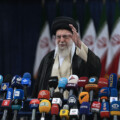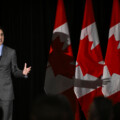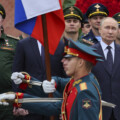Four days after the October 7 attack by Hamas that killed 1,200 people in southern Israel, mostly civilians, Israel’s war cabinet vowed to wipe Hamas “off the face of the earth.” And yet, despite one of the largest military mobilizations in the country’s history, and the rapid encirclement of Gaza City by the Israel Defense Forces (IDF), experts are skeptical about whether Israel can fully accomplish its objective. Some are also beginning to doubt that the predicted regional escalation will come to pass.
Janice Stein, the Belzberg Professor of Conflict Management in the Department of Political Science at the University of Toronto, does not believe the IDF has met its objective, which was to disable the capacity of Hamas to organize and launch attacks on Israel.
Despite the fact that the IDF has managed to kill several of the October 7 attack’s ground commanders, Hamas’s senior leadership remain far away from Gaza in safer locations, such as Qatar. As well, rockets have continued to be fired at Israel from inside Gaza, with Hamas claiming responsibility for an attack aimed at Tel Aviv on Monday.
“[This] suggests that there is still military capacity,” says Stein. “There are certainly reports from the IDF that infrastructure has been identified, attacked, and dismantled. But there was no way of knowing what proportion of the infrastructure or whether these are the most important pieces.”
Stein says that though it cannot be confirmed if it is Hamas who is launching all of the missiles—as opposed to groups such as Islamic Jihad—the underground tunnel system built by Hamas in Gaza is still largely intact, as the IDF is only operating in the northern part of the city. The tunnel system is crucial to Hamas’s military strategy, as it enables them to stay hidden from Israeli air strikes while remaining operational. In the past, Hamas has also been able to extend the tunnel system into Israeli territory beyond the border fence with Gaza.
Joshua Krasna, a former Israeli diplomat and a senior fellow at the Philadelphia-based Foreign Policy Research Institute, says that Israel’s goal of completely destroying Hamas is unrealistic. While this may be a popular position among the Israeli public, he points out that it is very difficult to annihilate a group like Hamas, which possesses a strong ideological component. Nevertheless, he believes Hamas’s ability to strike at Israel will be greatly diminished when the war ends.
“We’re destroying their capabilities. We’re killing their fighters, we’re destroying their infrastructure,” he says. “It will not be easy for them to rebuild what they’ve lost, because if there’s a political order in Gaza afterward—and we hope it’s going to be significantly different— it won’t be easy for them to covertly build back these capabilities.”
On Tuesday, Israeli Prime Minister Benjamin Netanyahu’s cabinet approved a four-day pause in the war in exchange for the release of Israeli hostages. Some Palestinian prisoners will also be returned to Gaza. Although Netanyahu has vowed that the war will continue after the truce expires, Stein says pressure from the United States may push Israel towards a full ceasefire.
“How long it is going to go on is largely a function of the pressure that the United States is going to put on,” says Stein, who expects the fighting to end by Christmas. “There’s a long history of this in virtually every war in the modern history of Israel—the United States eventually intervened to stop the fighting. And there’s nothing that makes me think this will be an exception.”
Krasna also predicts that this conflict will resemble previous wars waged by Israel, and believes that nobody in Israel wants the war to go on for a full year.
“It’s going to be shorter than Israel would want, and we’re going to achieve less than we want,” he says. “But that’s been true in every operation in every war that Israel has had.”
Regional escalation seems unlikely
Since the early days of the war, there has been speculation about regional escalation, especially on the northern Israeli border with Lebanon, where Hezbollah, an Iran-backed terrorist and militant group, has a strong presence. Estimates suggest that Hezbollah currently possesses 130,000 rockets, and it is described by the Washington, D.C.–based Center for Strategic and International Studies as the most heavily armed non-state actor in the world.
Iran is Israel’s top strategic rival in the Middle East, and the two countries have been waging a proxy conflict for decades. In fact, says Krasna, prior to October 7, there was an impression in Israel both strategically and publicly that Iran and Hezbollah were a greater danger than Hamas.
He says Netanyahu had been presenting Iran as Israel’s greatest threat for years while downplaying Hamas’s capabilities—a narrative that was bolstered by the effectiveness of Israel’s Iron Dome missile defence system, which intercepts and destroys most rockets launched from Gaza. Israel’s border fence with Gaza, and the perception that Hamas would moderate in order to pragmatically govern Gaza, also lulled Israel into a false sense of security.
Although Krasna says he was as surprised as anybody else when Hamas launched its attack in early October, he had always considered Hamas to be the bigger threat.
“In my view, the enemy is always going to be the person who kills the most of your people, not the person who theoretically could pose the greatest strategic threat,” he says.

While there have been sporadic clashes and artillery exchanges between Israeli and Hezbollah forces, they have not precipitated a full-scale war—and some experts now feel that regional escalation may not happen. While Krasna says that Hezbollah has an interest in “keeping that border hot,” and as such, are perceived as helping the Palestinian cause, they are not interested in a full-scale conflict.
Jeffrey Feltman, former U.S. assistant secretary of state for Near Eastern Affairs, also thinks a regional escalation is unlikely. Speaking to the Brookings Institute, he said that Hezbollah’s military buildup is intended to deter Israeli military strikes against Iran, and questioned whether Iran and Hezbollah would want to use their arsenal in support of the Palestinians. He also noted that the international narrative is already working against Israel, without any escalation from Hezbollah or Iran.
“Horror and anger over the civilian toll in Gaza transcend the initial outrage and sympathy over the October 7 butchery and abduction of Israelis,” he said. “Hezbollah and Iran take much satisfaction with Israel being branded the aggressor and may not want to complicate that impression.”
West Bank concerns
The outbreaks of violence between settlers and Palestinians in the West Bank have not received as much media attention as the war in Gaza, but Stein says the volatility there should not be underestimated—as evidenced by President Biden telling Netanyahu to put a stop to the provocations that Israeli settlers were engaging in there. She says there is evidence that Hamas members are currently present in the West Bank. Captured Hamas fighters have revealed that they were hoping to link up with Hamas members in the West Bank to provoke a general uprising.
Netanyahu’s centre-right Likud party is not closely linked to the settlers, unlike Likud’s more hardline coalition partners, whose leaders hold key cabinet positions in Netanyahu’s government.
“It may not be fully within the capacity of Netanyahu to stop this, but if he allows this to continue, he does so at his peril,” says Stein.
Recommended for You

Michael Bonner: Are we witnessing the last gasp of Iran’s Islamic Republic?

Need to Know: Yahoo, Alberta! You’re doing something right

Peter Menzies: Justin Trudeau’s legislative legacy is still haunting the Liberals

Need to Know: Mark Carney’s digital services tax disaster




